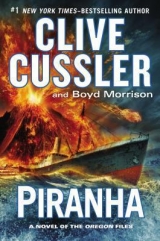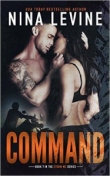
Текст книги "Piranha"
Автор книги: Clive Cussler
Жанр:
Политические детективы
сообщить о нарушении
Текущая страница: 4 (всего у книги 25 страниц)

Like a crocodile lying in wait for its prey, the submarine drifted at periscope depth as the supertanker cruised toward it. Two freighters had already passed by less than a thousand yards away. Few cargo vessels carried active sonar, so the sub remained undetected. As long as Linda Ross kept the Discovery 1000 below the surface, the oncoming 113,000-ton Sorocaima would have no way of knowing it was there.
The Discovery had been on-station for the past four hours since the Oregon had lowered it into the Caribbean fifty miles north of the Venezuelan coast. The shipping lane curved around the island of Nueva Esparta before turning east. The spot was chosen because it was along a well-traveled route for tankers from Puerto La Cruz heading to the Mediterranean.
The mini-sub was large enough to carry eight passengers to a depth of one hundred feet, but it currently held only Linda and the two men playing cards behind her. This would be a quick in and out mission, and more than two men infiltrating the tanker would increase the risk of them being seen.
Linda, a Navy vet who’d served aboard a guided-missile cruiser and as a Pentagon staffer before she was hired by the Corporation to be vice president of operations, was beneath only Juan and Max in the crew hierarchy. Her petite figure, upturned nose, and soft voice had once been a hindrance in her career, preventing her from being taken seriously enough to ever warrant command of her own ship. But she’d earned the respect and trust of everyone on the Oregon, to the point that she was tagged to lead some of its toughest missions. She had a habit of changing her hair color often and tonight her long ponytail was a fiery red.
Linda peered at the monitor showing the feed from the periscope camera. The full moon and starlight enhancement turned night to day, and the outline of an approaching tanker was unmistakable. Though she couldn’t read the name on the side of the ship from this distance, there was no doubt it was their target. The tracking device Linc had planted on the vessel during his visit to Puerto La Cruz pinged strongly. The Sorocaima was right on schedule, only a mile off their stern.
“Here she comes, guys,” she said.
Marion MacDougal “MacD” Lawless and Mike Trono looked up from their cards. The two gundogs, as Max called members of the shore operations team, had been playing gin rummy, and from the Cajun-inflected whoops of triumph she’d been hearing from MacD for the past two hours she guessed he was trouncing Mike.
“It’s just as well,” Mike said, and tossed his hand on the pile. “I was about to find out how this grunt was cheating.”
As VP of operations, Linda knew the files of every crew member backward and forward. Sporting thin brown hair atop a slender frame, Mike had been an elite pararescue jumper for the Air Force, dropping behind enemy lines multiple times in Iraq and Afghanistan to save downed pilots. He left the military and got his kicks racing offshore powerboats before joining the Corporation when he realized the adrenaline surge of real-world operations was the only thing that would do the trick.
“Cheatin’?” MacD retorted in his molasses-thick Louisiana drawl. “Why would Ah have to cheat against a wing nut like you? Ah’m just good.”
“Because that would make life really unfair. You can’t be good at cards and look like an underwear model.”
Linda had to agree with Mike on that. While Mike was cute and lean, former Army Ranger MacD had a physique sculpted in marble and a face fit for a movie star. He was one of the newest members of the crew, and his down-home New Orleans charisma and quick thinking in battle had charmed everyone on the Oregon.
“Now Mike, you and Ah are two sides of the same coin,” MacD said.
“How’s that?”
“Neither of us was stupid enough to become a swabbie.”
They both turned toward Linda, the lone Navy person on the mini-sub, and pointedly stared before laughing heartily. Mike and MacD were the butts of good-natured ribbing on the Oregon for being the only two non–Navy vets on the ship, but now she was the one outnumbered.
She stared back at them stoically but with a twinkle in her eye. “That’s it. I order the both of you to walk the plank.”
“Yes, ma’am,” they said in unison, and started donning their black night gear—sweaters, pants, gloves, boots, and hats. The final touch was black greasepaint smeared on their faces.
While they were preparing for their excursion, Linda engaged the motor and aimed the Discovery directly into the path of the oncoming Sorocaima, which was on its way to the North Korean port of Wonsan.
The tanker held ten million gallons of refined diesel, ready for use by the North Korean Army for almost every vehicle in their arsenal. With fuel embargoed by most other nations and having few refineries of their own, the increasingly belligerent North Koreans depended on regular diesel shipments from Venezuela, whose president was a personal friend of their leader. Without the fuel, the North’s armed forces would grind to a halt.
The Oregon could easily sink a ship of even the Sorocaima’s size with the weapons at its disposal, but the mission was more subtle than that. Not only did the Corporation refuse to sink unarmed vessels but there was no shortage of tankers or Venezuelan oil, so at best the shipment would only be delayed. Instead, Linda, MacD, and Mike were going to ruin the fuel on board the tanker, laying waste to a huge swath of vehicles in the North Korean military.
At the back of Discovery were six thermos-sized canisters, one meant for each hold on the tanker. The canisters were loaded with bacteria developed in secret by the Defense Advanced Research Projects Agency, or DARPA. Mutated from a strain of the anaerobic bacteria clostridium and dubbed Corrodium by the biologists who created it, the microbe multiplied easily in diesel, contaminating an entire tank once it was introduced. It was colorless and odorless, so the contamination was undetectable without laboratory testing.
The bacteria changed the composition of the diesel so that it would burn much hotter. When the tainted diesel was ignited in engines, it would cause them to overheat and seize up, resulting in a total loss. With luck, the Corrodium that they had injected into the holds of the Sorocaima would go on to infect the entire North Korean supply, rendering it unusable and destroying the engines of any vehicles into which the diesel had been loaded.
The hard part was getting the Corrodium into the fuel without being detected. If there was any suspicion that the diesel had been tampered with, the Sorocaima crew would test it and find out the problem long before it reached Wonsan. Once the North Koreans knew about the potential for bacterial infection, they would have every delivery of diesel tested for it. Linda and her team had to get the mission right the first time because there wouldn’t be a second.
The delicacy of the operation was also the reason for conducting it simultaneously with the Chairman’s recon mission. If they were done separately and the initial one in the sequence failed, success with the other operation would be in jeopardy.
Linda’s responsibility on this mission was to keep the mini-sub on-station while MacD and Mike climbed the side of the tanker with the Corrodium and delivered it into the holds using the ship’s own deck piping system.
But they couldn’t get on the ship while it was moving. Even if they could match the tanker’s speed, maneuvering the Discovery next to it and keeping it stable while MacD and Mike tried to disembark was a recipe for disaster. They had to get the Sorocaima to stop.
Disabling the tanker in any way was out of the question. It might be tugged back to port, instead of going on to North Korea, and investigators might realize the damage was intentional, prompting questions about who had done it and why. Stealth was the only option, and it had a side benefit as well. If the North Koreans blamed the Venezuelans for the contamination, it would make them less likely to trust their suppliers for future diesel shipments.
It was Max as usual who had used his engineering expertise to devise a way to get a tanker to stop without hijacking or damaging it.
The Discovery’s robotic arms cradled an apparatus the size and shape of a coffin, flat on the long sides, with watertight Plexiglas sealing the ends and an uninflated tube on top. A filament connected the object, which they called the beatbox, to a control system inside the mini-sub. When attached to the hull, the beatbox, which was equipped with a high-impact rotating hammer, would knock with each rotation of the propeller shaft.
No captain likes to be stranded in the middle of the ocean with a dead engine, so the mechanical systems are tuned and maintained rigorously to run at peak operating efficiency. If the engineer heard a pounding in the engine room that couldn’t be located, he would recommend that they stop the ship until the problem could be diagnosed. Of course, in this case there wouldn’t be a problem at all, and the onboard instrumentation would tell them that. Max estimated they would have thirty minutes before the engineer deemed the engines safe and cranked them back up.
“Hold on, boys,” Linda said. “We’re heading under.”
She flicked the joysticks expertly and dived the sub, maneuvering the Discovery so that it was below the path the Sorocaima would take. The rush of water being pushed by the immense tanker’s bow grew until it sounded as if the sub were a barrel floating toward Niagara Falls.
Using the onboard LIDAR, or light detection and ranging system, which relied on a series of reflected lasers that would re-create a three-dimensional image of anything they saw, Linda could see the tanker’s hull soar over them like a zeppelin drifting through the clouds.
Linda clicked on her on-screen control and the tube on top of the beatbox inflated until it made the apparatus neutrally buoyant. She retracted the robotic arms and then backed the Discovery away, unspooling the filament control wire as she did. She stopped when she was a hundred yards away.
The positioning was perfect. The beatbox hovered twenty feet below the centerline of the tanker.
The tanker’s gigantic single screw thrashed as it got closer. Linda would have to time this right. Too early and she’d get the beatbox too far forward of the engine room to be mistaken for a problem with the turbine. Too late and she’d get the beatbox chewed up by the screw or miss the tanker entirely. If that happened, there was no way the sub would be able to catch up and try again.
When the last hundred feet of the tanker passed overhead, she clicked another button, activating the powerful magnet on the beatbox. It flipped as the magnetized side was pulled by the steel hull of the Sorocaima. A loud bang signaled that the beatbox had made contact and was holding fast to the tanker only four feet from where Linda had been aiming.
The filament continued to feed out. She clicked another button and the hammer inside the beatbox started to pound away. She nudged the joysticks forward to the sub’s maximum speed so that they would be as close as possible when the tanker came to a stop.
“Keep your fingers crossed,” she said.
There was an agonizing wait as she looked for any signs that the tanker was slowing. A thousand yards of the filament had already played out. They had three thousand to go. After that, she’d have to cut it loose.
Another thousand yards came and went before she finally saw the unspooling of the filament slowing down.
“Good old Max,” she said.
“I knew he wouldn’t let us down,” Mike said, rechecking the pistol that he was bringing along as a precaution even though their mission was to avoid any contact.
“Looks like we’re going to have ourselves a cliff face to tackle,” MacD said, and assembled their climbing gear.
When the Discovery caught up with the now stationary tanker, Linda’s watch told her that they had twenty-five minutes left out of Max’s thirty-minute limit. She surfaced the Discovery next to the bow, as far as possible from the engine room and bridge, where the center of activity would be taking place right now.
MacD popped the hatch and looked outside. When he came back in, he wore a grim expression.
“We’ve got something of a problem,” he said.
Linda leaned forward and peered up through the mini-sub’s front viewport. She immediately saw what MacD meant.
They were expecting the Sorocaima to be dark except for its running lights, the cloud cover allowing Mike and MacD plenty of pitch-black areas of the deck to move through unnoticed. That would be impossible now. From stem to stern, the tanker was lit up like a Christmas tree.

Red battle station lighting bathed the bridge of the frigate Mariscal Sucre in a hellish splendor that Admiral Dayana Ruiz relished. She had risen to her position as the top-ranking woman in the Venezuelan military not only because of her refusal to accept anything less than perfection from her subordinates but also because of her ability to command a ship in battle. She had never lost a war game exercise, and now she had the opportunity to show off her skills in actual combat.
She only hoped that the ship called Dolos was as formidable as the stories had claimed. The tip she’d received about the tramp freighter and its captain had come from an officer in the Libyan Navy she had met at an arms bazaar in Dubai. He told her that he had experienced the mythical ship’s capabilities firsthand when it had nearly destroyed his frigate, the Khalij Surt—the Gulf of Sidra. Although she’d heard secondhand tales of such a covert ship, she had previously dismissed them as fantasy. But the officer’s eyewitness account was compelling. She spread word throughout the naval community that she would be happy to bag the mystery ship as a prize.
Then Gao Wangshu of the Chinese Navy had come to Ruiz with a story similar to the Libyan’s. He had intelligence that the ship would be coming to Venezuela, although he thought the port of call would be Puerto Cabello. At the last minute, he gave word that La Guanta was where it would dock, and she sent him to the harbormaster there to get confirmation it was the right ship.
Now it seemed like she had even more reason to believe the Dolos was a spy ship. The call from Lieutenant Dominguez about the two impostors who had tied him up couldn’t be a coincidence.
Ruiz finished her black coffee as she angrily waited for the phone call from Puerto La Cruz. She wanted to fling the mug against the window, but the rigid reflection staring back at her made her stop. Her short raven hair, tan angular face, and tall, ramrod-straight frame under an immaculately pressed uniform, projected the reputation she had as an ice-cold commander, ready to sacrifice anyone or anything for victory. Any histrionics would dispel that image and allow the macho Latin American men under her command an opportunity to question her ability. She would not let that happen, but these latest developments were testing her stoicism.
Lieutenant Dominguez was one of her brightest pupils and she had trusted him with some of the most valuable information about her operations that would propel her planned rise to power in the Venezuelan government. There had already been a female defense minister, but her ambitions were much higher than that. Hugo Chávez had been her idol and she foresaw following in his footsteps.
But Dominguez had let her down and her empire was threatening to crumble.
She had called him to check on the status of her arms smuggling operation. When he didn’t answer, she had called the guardhouse at the warehouse to check on him. Soon after the guards arrived at the security office, they found Dominguez and another man tied up in the bathroom. She immediately ordered the entire facility locked down so they could find the impostors who had sneaked in. She was now awaiting news that they had been found since no one had seen them leave the base.
The phone rang and she snatched up the receiver.
“Report,” she snapped.
“Dominguez here, Admiral,” he said. “We have them cornered.”
“Where?”
He cleared his throat. “On the ship. They’re in the cargo bay. They knocked one of my men unconscious and locked themselves inside.”
Ruiz had to find out who they were, how they’d discovered her operation, and whether any other part of it was in jeopardy.
“I want them captured alive,” she said.
“Yes, ma’am. We have all the exits covered.”
“What about the cargo door?”
“We’ve cut power to that part of the ship. There’s no way they can lower it. I have fifty additional men on the way. There’s no way they can escape.”
“Do you know what they were after?”
Another hesitation.
“Don’t lie to me, Lieutenant. I will find out.”
“They took the laptop and my phone.” He added quickly, “The computer is encrypted and I destroyed the phone, so they won’t be able to transmit any information from inside the ship.”
Ruiz’s hand tightened on the mug until it seemed in danger of shattering.
“You had better be right, Dominguez, or I’ll use you for target practice.”
She could hear him gulp. “Aye, Admiral.”
“Describe these men.”
“Both were dressed in Navy uniforms. One was a large black man. The second . . . well, I could have sworn he was Captain Ortega. But, then, he thought you were a man. I was about to arrest him, but he and the other impostor were so quick—”
“Enough. I’ll read about it in your report later. Call me the moment you have them in custody.”
She hung up without waiting for acknowledgment.
The news that they’d gotten hold of the computer and phone was the most disturbing part of Dominguez’s report. She could survive the discovery of her arms smuggling operation, but if anyone outside her inner circle found out about the second aspect of her illicit activities her standing in Venezuela would be destroyed. She’d be executed as a traitor.
She retreated to her cabin. The next calls required more privacy.
Ruiz dialed a number that she had memorized. She erased the number after every call.
On the second ring, a clipped voice answered. “What?”
“We’ve had an incident, Doctor,” she said in fluent English using the only name she knew him by.
“So?”
“I want to make sure it doesn’t jeopardize my plans. Is the Ciudad Bolívar on schedule?” she asked.
“It will be in position in thirty-six hours just like I said it would.”
“Have you detected any interest in our activities?”
“No,” the man replied. “I expect the final payment to come through as soon as the Bolívar goes down.”
“And in exchange you will hand over the encrypted software code for controlling the drones as we agreed?”
“Yes,” the Doctor said.
“Then we’ll proceed. Dominguez will report when the Ciudad Bolívar is sunk. Make sure the drones are ready by tomorrow night.”
“Of course. That’s why you’re paying me.”
He hung up. Ruiz wasn’t used to being treated with such disrespect, but the Doctor’s special skills demanded that she tolerate insubordination that would get a sailor sent to the brig.
Her next call was to the harbormaster, Manuel Lozada. She was afraid that the Dolos would cast off early and leave the spies behind if they knew they were cornered and would eventually confess to the covert ship’s true nature.
“A pleasure to hear from you, Admiral,” he said upon answering. “I was just about to—”
“Lozada, I want you to raid the Dolos. I will have thirty soldiers there in ten minutes to assist the police.” She would redirect some of Dominguez’s reinforcements to La Guanta Harbor.
“But Admiral, that’s why I was about to call you. The Dolos has just cast off.”
“What? You gave them permission?”
“Yes. You told me that you would capture them at sea, so I thought . . .”
Ruiz was steaming. She had idiots working for her. But she kept her voice calm.
“Lozada, do whatever you can to slow them down. If they leave Venezuelan waters before we get there, capturing them would cause an international incident.”
“At once, Admiral!”
“And use any information that Gao can tell you about the ship. It might give you a tactical advantage.”
“Excellent suggestion, Admiral. We will do everything in our power to keep them from leaving.”
“I want regular updates about its location.”
She hung up, and strode back onto the bridge. She checked their position. They were still forty miles from Puerto La Cruz. At their present speed, they would reach the port in a little more than an hour.
The Mariscal Sucre, a Lupo-class frigate, was the pride of the Venezuelan Navy. It was armed with a 127mm forward gun, eight Otomat Mark 2 surface-to-surface missiles, and twin Mark 32 triple torpedo tubes. Ruiz had no compunction about unleashing her arsenal on the spy vessel no matter how well armed or how defenseless it was.
She just had to make sure they got there in time.
“Captain Escobar,” she barked to the ship’s commander, “I don’t care if you burn the turbines out. Give me all the speed you can muster.”
After a smart “Aye, aye,” Ruiz could feel the ship vibrate from the increased output, matching the adrenaline coursing through her system. She had never been more ready for a fight, and there was no way she would be denied her victory.








